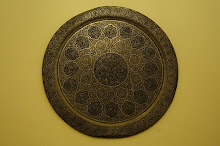
In the tenth century, the city of Cordoba was the New York and Paris of its time, the centre of cultural activity, with over seventy libraries and even more centres of translation and learning. It was also known for its pervasive street lamps, and well-lit and paved streets – a stark contrast to the mud and darkness of its northern counterparts, like medieval London. This Andalusian city was the centre of learning and intellectual effervescence in Europe.
By the mid-twelth century, however, a new Islamic and Berber dynasty, the Almohad (or, more tellingly in Arabic, ‘Al-Muwahiddun’ or ‘unitarians’ or ‘unifiers’) had taken over the Andalus, imposing a stricter and less tolerant interpretation of Islam than previous rulers.
It was in this more difficult and darker environment, that these two men, Musa Ibn Maimoun (Maimonides) and Ibn Rushd (Averroes), a Jew and a Muslim, were born in Cordoba, nine years apart. They grew to leave a lasting legacy on both Islam and Judaism and to become known, in later times, as the ‘Second Moses’ and the ‘Second Aristotle’, respectively. Through their later impact on an Italian studying in Paris, they also changed the future of Christianity, and the cultural development of Europe.

The two men were both the sons of jurists, and became in their own way, intellectual revolutionaries. They brought the logic of reason into a world whirling often with blind faith, testing and questioning many long-held premises in their societies, and gaining much opprobrium from the religious powers of their time.
Both men were profoundly influenced by Aristotle and saw no contradiction between believing in a greater universal faith and utilizing reason to the utmost of an individual’s capacities – as the great Greek philosopher had so clearly demonstrated in his texts.
Oddly, their lives also paralleled each other. Both men lived out difficult worldly versions of their intellectual daring. The two men were cast out of Cordoba and both lived in exile in Fez for a time - neither able to return home again. Both also became authorities in their respective religious traditions, as well as court physicians: Ibn Rushd, originally, to the ruler of Cordoba, and Ibn Maimoun to Salaheddine in Egypt.
Ibn Mainoun wrote that “the truth should be pursued from whatever source that it proceeds,” and both men died as they lived. Ibn Rushd lost his life in Marrakesh, under suspicious circumstances, likely while under house arrest by the Almohads for his philosophy. Ibn Maimoun died in Egypt or Tiberias from ill-health brought on from a maniacal work routine of writing, medical healing and community service.
Their brilliance arose out of a marked humility regarding the place of the human in the larger scheme. As Ibn Maimoun wrote:
“Now consider the enormous dimensions and the large number of these material beings. If the whole earth is infinitely small in comparison with the sphere of the stars, what is man compared with all these created beings! How, then, could any one of us imagine that these things exist for his sake and benefit, and that they are his tools! This is the result of an examination of the corporeal beings: how much more so will this be the result of an examination into the nature of the Intelligences!"
Despite their tribulations, their legacies ultimately lived on in a man called Thomas Aquinus - an Italian studying at the University of Paris, who absorbed their works and, through his own thinking, changed forever the philosophy behind the Roman Catholic church. Aquinus brought the power of reason into the intellectual infrastructure of the church, and from there into the development of knowledge and education of Europe and the West as we now know it.

Oddly, their lives also paralleled each other. Both men lived out difficult worldly versions of their intellectual daring. The two men were cast out of Cordoba and both lived in exile in Fez for a time - neither able to return home again. Both also became authorities in their respective religious traditions, as well as court physicians: Ibn Rushd, originally, to the ruler of Cordoba, and Ibn Maimoun to Salaheddine in Egypt.
Ibn Mainoun wrote that “the truth should be pursued from whatever source that it proceeds,” and both men died as they lived. Ibn Rushd lost his life in Marrakesh, under suspicious circumstances, likely while under house arrest by the Almohads for his philosophy. Ibn Maimoun died in Egypt or Tiberias from ill-health brought on from a maniacal work routine of writing, medical healing and community service.
Their brilliance arose out of a marked humility regarding the place of the human in the larger scheme. As Ibn Maimoun wrote:
“Now consider the enormous dimensions and the large number of these material beings. If the whole earth is infinitely small in comparison with the sphere of the stars, what is man compared with all these created beings! How, then, could any one of us imagine that these things exist for his sake and benefit, and that they are his tools! This is the result of an examination of the corporeal beings: how much more so will this be the result of an examination into the nature of the Intelligences!"
Despite their tribulations, their legacies ultimately lived on in a man called Thomas Aquinus - an Italian studying at the University of Paris, who absorbed their works and, through his own thinking, changed forever the philosophy behind the Roman Catholic church. Aquinus brought the power of reason into the intellectual infrastructure of the church, and from there into the development of knowledge and education of Europe and the West as we now know it.














No comments:
Post a Comment